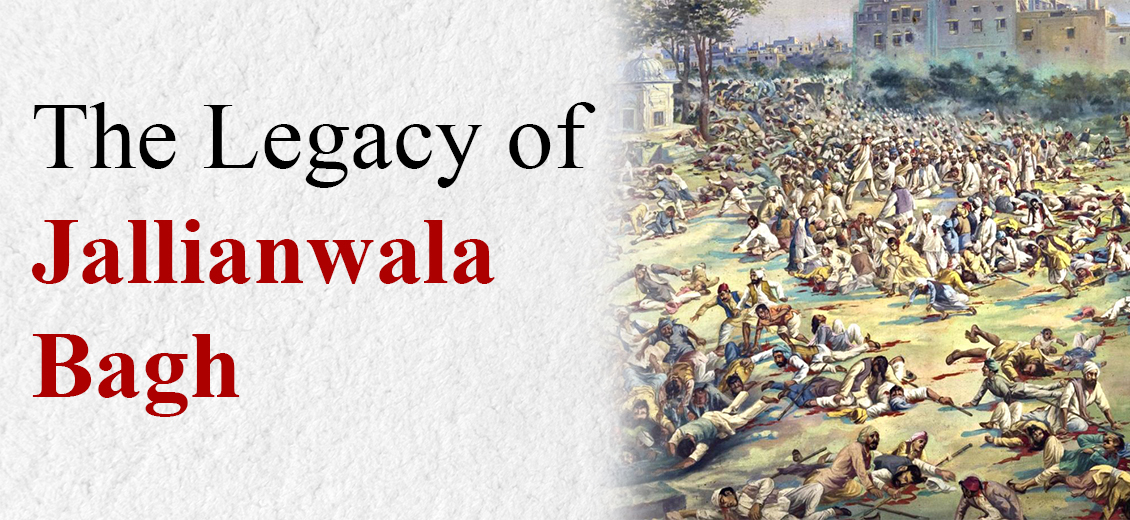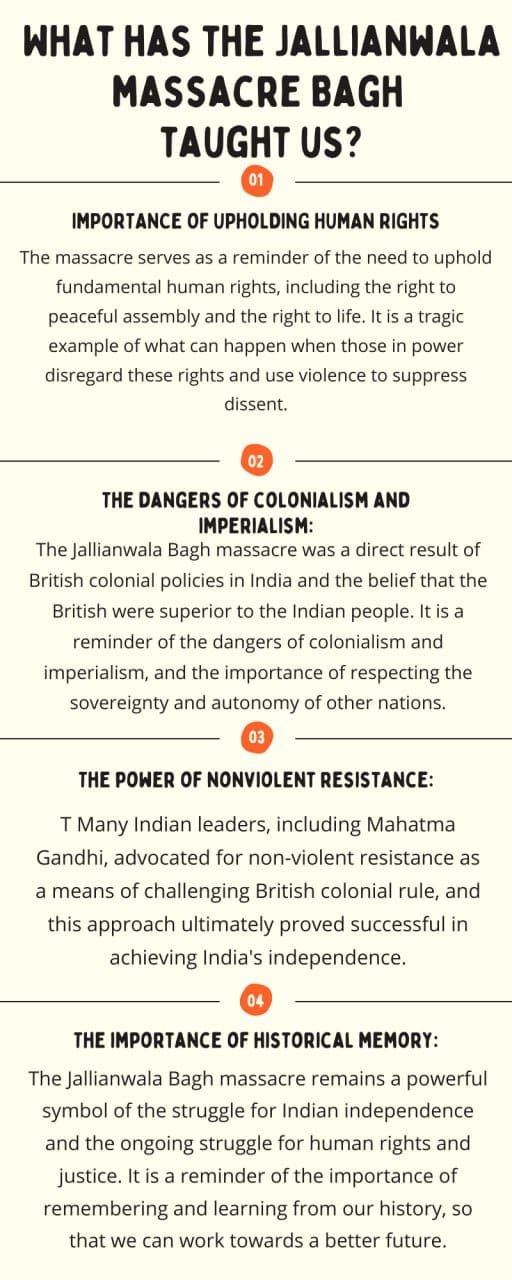The Legacy of Jallianwala Bagh
Blogs Home
- 13 Apr 2023

The Jallianwala Bagh massacre occurred on April 13, 1919, in the city of Amritsar, Punjab region of India, during British colonial rule. British Indian Army soldiers, under the command of Colonel Reginald Dyer, opened fire on a peaceful gathering of thousands of unarmed Indians who gathered in Jallianwala Bagh, a public garden, to protest against the British government's repressive laws.
The Jallianwala Bagh massacre marked a turning point in India's struggle for independence from British rule. It outraged the Indian people and led to a widespread movement of nonviolent civil disobedience led by Mahatma Gandhi. The incident also sparked international condemnation of British imperialism.
Timeline
- 18 March 1919
- On 18 March, 1919, the British government passed Rowlatt Act (also known as the Anarchical and Revolutionary Crimes Act of 1919). This Act allowed for speedy trials of offenses by a special court with no appeal and authorized the detention of political prisoners without trial for up to two years.
- 06 April 1919
- In response, Mahatma Gandhi initiated a non-violent Satyagraha against the Rowlatt Act on April 6, 1919. However, violent anti-British demonstrations erupted in several cities, particularly in Punjab due to wartime repression.
- 08 April 1919 – 09 April 1919
- Gandhiji was arrested on April 8, 1919, and two nationalist leaders, Saifuddin Kitchlew and Dr. Satyapal, were arrested on April 9, 1919, without any provocation.
- This caused anger among Indian protestors, who came out in thousands to show their solidarity with their leaders. In due course, the demonstrations became violent, prompting the authorities to enforce martial law and entrust law enforcement in Punjab to Brigadier-General Dyer as a measure to manage any future uprisings.
- 13 April 1919
- On April 13, 1919, on Baisakhi day, a large crowd gathered in Jallianwala Bagh, unaware of the prohibitory orders in Amritsar. Brigadier-General Dyer arrived on the scene with his troops, surrounded the gathering, and blocked the only exit point.
- He then ordered his troops to open fire on the unarmed crowd, resulting in the death of over 1000 men, women, and children.
- 18 April 1919
- Rabindranath Tagore renounced his knighthood in protest.
- Mahatma Gandhi gave up the title of Kaiser-i-Hind, bestowed by the British for his work during the Boer War.
- Gandhi was overwhelmed by the atmosphere of total violence and withdrew the movement on April 18, 1919.
- A non-official committee was formed by the Indian National Congress. The committee had members Motilal Nehru, C.R. Das, Abbas Tyabji, M.R. Jayakar, and Gandhi, to investigate the shootings.
- Congress condemned Dyer's actions as inhumane and criticized the imposition of martial law in Punjab.
- 14 October 1919
- On October 14, 1919, the government formed the Disorders Inquiry Committee, also known as the Hunter Commission, to investigate the Jallianwala Bagh shootings.
- The committee, chaired by Lord William Hunter, had Indian members and submitted its final report in March 1920, unanimously condemning Dyer's actions.
- However, no penal or disciplinary action was taken against General Dyer.
- In March 1922, the government repealed Rowlatt Act.
- The Jallianwala Bagh massacre became a turning point in India’s struggle for independence from British rule.
Root cause of Jallianwala Bagh
The Jallianwala Bagh massacre was a tragic event that had its roots in the socio-political context of India at that time. The underlying causes of the massacre trace back to the British colonial policies in India and the growing Indian nationalist movement, which was seeking greater political rights and self-governance.
One of the main factors was the Rowlatt Act which was passed by the British Indian government in March 1919. The Act gave the government sweeping powers to arrest and detain individuals without trial for an indefinite period of time. This led to widespread protests and demonstrations across India, including in Amritsar, where the Jallianwala Bagh massacre took place.
Another factor that contributed to the massacre was the growing Indian nationalist movement which was seeking greater political rights and self-governance. Many Indian leaders and activists, including Mahatma Gandhi, opposed the Rowlatt Act and called for peaceful protests and civil disobedience to challenge it.
The British colonial authorities, however, responded with violence and repression, which further inflamed tensions between the British and Indian communities. The decision by General Dyer to order his soldiers to open fire on a peaceful gathering of unarmed civilians in Jallianwala Bagh was an extreme and brutal response to the growing Indian nationalist movement and the protests against the Rowlatt Act.
In summary, the root cause of the Jallianwala Bagh massacre is a combination of British colonial policies, the growing Indian nationalist movement, and the violent response of the colonial authorities to peaceful protests and demonstrations.
Political Leaders who condemned the Jallianwala Bagh massacre
The Jallianwala Bagh massacre was widely unaccepted both in India and internationally. Many political leaders at that time spoke out against the brutality of the massacre and called for justice and accountability.
Here are some of the notable political leaders:
- Mahatma Gandhi: One of the most prominent leaders of the Indian nationalist movement, Gandhi. He was one of the first to condemn the Jallianwala Bagh massacre. He called for peaceful protests and Civil Disobedience in response to the violence.
- Rabindranath Tagore: A Bengali poet, writer, and philosopher, Tagore was the first Indian to win the Nobel Prize in Literature. He renounced his knighthood in protest against the Jallianwala Bagh massacre. And wrote a scathing letter to the British Viceroy, Lord Chelmsford, condemning the violence.
- Jawaharlal Nehru: A leading figure in the Indian nationalist movement and later the first Prime Minister of India, Nehru was a vocal critic of British colonialism. And speaking out against the Jallianwala Bagh massacre, calling it a "monstrous crime".
- Winston Churchill: A British politician and statesman, Churchill was an outspoken critic of the British government's handling of the Jallianwala Bagh massacre. He called for an inquiry into the incident and described it as "a monstrous event".
- Annie Besant: A British socialist and women's rights activist who became a prominent leader in the Indian nationalist movement. Besant condemned the Jallianwala Bagh massacre and called for India to be granted greater political autonomy and self-rule.
These are just a few examples of the many political leaders who spoke out against the Jallianwala Bagh massacre.
What did the Jallianwala Bagh massacre teach us?
The Jallianwala Bagh massacre serves as a powerful reminder of the importance of upholding human rights. Also, respecting the sovereignty and autonomy of other nations, and the power of nonviolent resistance in achieving social and political change.
Personal stories
- One such individual was Udham Singh, who witnessed the massacre as a young man and was deeply affected by it. He made it his life's mission to seek revenge for the injustice that had been done to his people. And in 1940, he assassinated Michael O'Dwyer, the former Lieutenant Governor of Punjab who had ordered the firing at Jallianwala Bagh.
- Another witness to the massacre was Baisakhi Ram, who was present with his wife and two children. He managed to escape the bullets. And later described the horror of seeing women and children being shot down by British troops. His wife and one of his children were injured but survived the attack.
- Yet another witness was Kishori Lal, a journalist who was reporting on the protest. He was arrested by the British authorities and detained for several months for his coverage of the event. Upon his release, he continued to report on the Indian independence movement and became an advocate for freedom of press.
The Jallianwala Bagh massacre impacted many lives and the incident had a profound effect on the Indian people. And it continues to be remembered as a tragic moment in India's struggle for independence.
Political implications
The Jallianwala Bagh massacre had significant political implications both in India and in the United Kingdom. From a political perspective, the massacre galvanized the Indian independence movement. And increased support for the Indian National Congress, the main political party advocating for Indian independence. The Congress called for a nationwide strike and organized protests against the British government. Also, demanding accountability for the massacre and India's independence.
The British government was also impacted politically by the Jallianwala Bagh massacre. It caused a rift between the British and Indian populations and fueled anti-British sentiment in India. The incident also led to calls for the British government to grant greater political and economic autonomy to India as well as increased the pressure for the British to relinquish their colonial rule.
Conclusion
The political fallout of the Jallianwala Bagh massacre was felt beyond India and the United Kingdom. The incident garnered international attention and condemnation, with leaders from around the world, speaking out against British imperialism and the actions of Colonel Dyer and his troops. All in all, the Jallianwala Bagh massacre had a significant political impact, both in terms of shaping India's struggle for independence and exposing the brutality of British colonial rule. The event remains a poignant reminder of the power dynamics of imperialism and the struggle for self-determination.
Akai Negi
Akai Negi has done her Masters in Pol Science after completing her graduation from DU. She has keen interest in writing, blogging and journaling. When it comes to writing, she likes to do research and investigate on topics of interest.
Source
https://www.drishtiias.com/current-affairs-news-analysis-editorials/news-analysis/08-04-2019/print
Blogs Home




